- Home
- Tennessee Williams
Orpheus Descending and Suddenly Last Summer
Orpheus Descending and Suddenly Last Summer Read online
Lois Smith as Carol Cutrere and Cliff Robertson as Valentine Xavier in the original 1957 Broadway production of Orpheus Descending.
CONTENTS
Introduction by Martin Sherman
Orpheus Descending
Introduction by Martin Sherman
Suddenly Last Summer
“The Past, the Present, and the Perhaps”
an essay by Tennessee Williams
A Chronology
INTRODUCTION TO
ORPHEUS DESCENDING
When Tennessee Williams’s Orpheus Descending opened on Broadway in March 1957, the esteemed critic of The New York Times, Brooks Atkinson, called it “one of Mr. Williams’s pleasantest plays.” The pleasantries in Orpheus Descending include murder, death by blowtorch, convicts eaten alive by dogs, religious fanaticism, hysterical blindness, promiscuity, abortion, lynchings, substance abuse, cancer, prostitution, and arson. In fairness, Atkinson had been watching a tepid production, which he praised, misdirected and miscast, with the blazing exception of a febrile, wraith-like Carol Cutrere played by America’s most unheralded great actress, Lois Smith.
Perhaps Atkinson was referring to its themes of love and redemption. For in Orpheus Descending there is a genuine merging of souls; two lonely and spiritually intense people find physical and emotional solace in each other, which, except in The Rose Tattoo, is an unusual destination in a Williams play. But in The Rose Tattoo they have a future; here, in Orpheus, a true descent into hell, they are done for. It’s as if Williams is saying: If you are sensitive and lucky, you might find someone else sensitive to understand you, but no matter, the world will destroy you anyway. Like most great artists, his was a constant battle between hope and despair. Atkinson found Williams in “a more humane state of mind than he has been in several years.” Which of course begs the question, when wasn’t Tennessee Williams in a humane state of mind? What other playwright has found so much beauty in the most unlikely places?
The unlikely place in Orpheus Descending is one of the most venal and corrupt Southern towns ever created, except, of course, it wasn’t created: it was an accurate reflection of its time and period. (Atkinson called it “an attractive locale.”) I always find it interesting that it is Arthur Miller and not Williams who is labeled the social realist. I doubt that the American theater has ever had a more acute social realist than Tennessee Williams. The confusion is that he was writing realistically about poetic people. When I was very young I spent some time in Louisiana and discovered to my shock that it was all true. Williams hadn’t made anything up. People talked and behaved the way his characters did. He was virtually reporting. In those days I came upon a burgeoning Blanche DuBois, a Maggie-the-Cat in waiting, Carol Cutrere minus the white makeup, Val Xaviers by the dozen, and innumerable Sister Women and Brother Men, together with hordes of no-neck monsters. I knew, too, a former Southern belle, married to a dentist in New York, who was Amanda Wingfield incarnate. These people all used language in the most gloriously imaginative way.
It is interesting to note that Lady Torrance, a full and vividly created character, is not the person who speaks poetically in Orpheus. The great lines in the play, the ones that are often quoted—“we’re all of us sentenced to solitary confinement inside our own skins, for life,” “there’s something wild in the country that only the night people know,” “what on earth can you do on this earth but catch at whatever comes near you, with both your hands, until your fingers are broken”—are said by Val and Carol, both Southerners and thus both speaking as they would. Lady is European; her language is more pragmatic—“the show is over, the monkey is dead.” Williams was meticulous about the way his characters spoke; often they are Southern and thus often they soar.
My newfound Southern friends were, of course, all outcasts, even poor Phoebe (the Amanda) stuck in the Bronx. Some were from small towns in Mississippi, and once I accompanied a friend back to her former home where the prevailing attitudes were frighteningly similar to the ones in Orpheus Descending.
The motivating force in Orpheus’s town (curiously unnamed) is racism. Racism is the one word I left out in my list of subject matter above and yet it is probably the most important. Racism drives the play and ultimately destroys all its decent characters. Papa Romano, Lady Torrance’s father, is burned to death by the Ku Klux Klan because “he sold liquor to niggers” twenty years before the play begins. That’s it. The town fathers are basically not concerned that he sells illegal bootleg whisky or that his little arbor-restaurant features alcoves where unmarried couples can make love. His crime is pure and simple—he treated black men as if they were equals. So they kill him. At the end of the play Lady discovers that her husband, Jabe, led the Klan that fateful night; this discovery leads to her own death (bullet) and that of Val, the guitar-playing itinerant she has taken in (blowtorch). (Atkinson: “a sense of small-town realities.”) A single act of racial tolerance and the hatred it sets off have caused the central tragedies of the play.
There are two other characters with wounded souls: Carol Cutrere, a rich girl who wanders in and out of the town she has been exiled from, and Vee Talbott, the artistic wife of the sheriff. Carol’s history is fascinating. She has used up all of her inheritance trying unsuccessfully to put up free clinics for the local black population in order to stop “the gradual massacre of the colored majority in the county.” She then starts a march to the state capital to protest the death sentence of a black man accused, in a case similar to the Scottsboro Boys, of raping a white woman. Except, she only makes it six miles out of town, whereupon she’s arrested for lewd vagrancy. This sends Carol, already vulnerable, over the edge—she decides to indeed become a lewd vagrant and thus the damaged creature we meet in the play. The important fact about Carol, often overlooked, is that she was basically a civil rights worker, in a decade before they existed, and pays a terrible price for it. Vee, meanwhile has religious visions because she has been so distressed by the awful things she has witnessed as the wife of a sheriff—blacks beaten and lynched and “runaway convicts torn to pieces by hounds.”
All four of these sensitive souls are ruined by the racial hatred that exists around them. It seems to me that Orpheus Descending is in fact a play of great political bravery. More so than, for instance, The Crucible, unquestionably a brilliant play, but one which nonetheless creates a political metaphor in the distant past to suggest the present. Orpheus was written about the times in which it was written. There is no political metaphor. Williams is telling it exactly as it is—or was then—and condemning racial and social attitudes of a large area of America. Williams was often accused in the sixties of being politically silent. But he had already spoken out, years before. No one seemed to notice. Atkinson’s review, for instance, never hints that he has witnessed a play with political intent. It has been suggested, not least by Arthur Miller himself, that Williams’s work moved the individual and his inner life center stage and that social conditions were symbolized from within the personalities of the characters. That is, of course, partially true, but in Orpheus Descending, the inner poetic vision shares the stage with a crusading political conscience.
Just as Carol may seem a creature before her time, so too is Val. This role has often seemed unplayable, and it wasn’t until Stuart Townsend brilliantly embodied him in a production at London’s Donmar Warehouse in 2000 that he finally made sense for me. In Battle Of Angels (1940), the first version of Orpheus Descending, Val was a writer. Townsend took his cue from the original and reimagined Val as a man with a genuine poetic soul. Like many poets, he carries within him a delicate mixture of the genders. Atki
nson commended Cliff Robertson’s deeply dull performance in the original production as “manly,” which may in its day have seemed like an important corrective to Val’s gentler side, and indirectly assured us that the character really wasn’t gay. But Townsend simply showed us that Val was very much like a creature that was to emerge in America ten years later—a hippie—with an informal attitude toward sex, wandering the countryside with a guitar autographed by Woody Guthrie. How prescient of Williams to write about two young people—Carol and Val—who predicted the concerns and behavior of their counterparts a decade later.
There is another reason to love Orpheus Descending. It is a mess. It is disorderly. It wanders. It is itself a lewd vagrant. Characters command the stage, talk to the audience, set the scene, and then disappear for good parts of the play. The ending is old-fashioned melodrama. The central love story is not entirely convincing. It’s been rewritten too often. It won’t be taught in playwriting class. Well, maybe it should. For the play is the playwright. This, after all, was a disorderly man, and he nakedly puts this on stage. His mind jumps and challenges and taunts and flirts and sometimes flies way off the railway line, but it is always his mind. This is, of course, when his mind was still functioning. Some of his later plays are also a mess but not in the same way. Subtle connective tissues are by then missing in the work. What connects all the elements in Orpheus Descending is the hyperactive amusement and despair of Williams’s racing brain. The less controlled of the great Williams plays have a chaotic purity. A genius is stripping bare, hopping around on burning stones, falling down, jumping up again, but always showing us the goods. Atkinson, in his review, does concede Williams’s “magic style of writing” but laments that “he has not ordered his world as decisively as usual.” No, and from a scholastic point of view that’s a problem. But if you’re interested in the messy business of life or art, surely it’s a glory.
By the way, Brooks Atkinson has a Broadway theater named after him. Tennessee Williams does not.
Martin Sherman
ORPHEUS
DESCENDING
FOR MARION BLACK VACCARO
Orpheus Descending was presented at the Martin Beck Theatre in New York on March 21, 1957, by the Producers Theatre. It was directed by Harold Clurman; the stage set was designed by Boris Aronson, the costumes by Lucinda Ballard, and the lighting by Feder. The cast was as follows:
DOLLY HAMMA: Elizabeth Eustis
BEULAH BINNINGS: Jane Rose
PEE WEE BINNINGS: Warren Kemmerling
DOG HAMMA: David Clarke
CAROL CUTRERE: Lois Smith
EVA TEMPLE: Nell Harrison
SISTER TEMPLE: Mary Farrell
UNCLE PLEASANT: John Marriott
VAL XAVIER: Cliff Robertson
VEE TALBOT: Joanna Roos
LADY TORRANCE: Maureen Stapleton
JABE TORRANCE: Crahan Denton
SHERIFF TALBOTT: R. G. Armstrong
MR. DUBINSKY: Beau Tilden
WOMAN: Janice Mars
DAVID CUTRERE: Robert Webber
NURSE PORTER: Virgilia Chew
FIRST MAN: Albert Henderson
SECOND MAN: Charles Tyner
Other characters: CONJURE MAN, CLOWN.
ACT ONE
PROLOGUE
Scene: The set represents in nonrealistic fashion a general dry-goods store and part of a connecting “confectionery” in a small Southern town. The ceiling is high and the upper walls are dark, as if streaked with moisture and cobwebbed. A great dusty window upstage offers a view of disturbing emptiness that fades into late dusk. The action of the play occurs during a rainy season, late winter and early spring, and sometimes the window turns opaque but glistening silver with sheets of rain. “TORRANCE MERCANTILE STORE” is lettered on the window in gilt of old-fashioned design.
Merchandise is represented very sparsely and it is not realistic. Bolts of pepperel and percale stand upright on large spools, the black skeleton of a dressmaker’s dummy stands meaninglessly against a thin white column, and there is a motionless ceiling fan with strips of flypaper hanging from it.
There are stairs that lead to a landing and disappear above it, and on the landing there is a sinister-looking artificial palm tree in a greenish-brown jardiniere.
But the confectionery, which is seen partly through a wide arched door, is shadowy and poetic as some inner dimension of the play.
Another, much smaller, playing area is a tiny bedroom alcove which is usually masked by an Oriental drapery which is worn dim but bears the formal design of a gold tree with scarlet fruit and fantastic birds.
At the rise of the curtain two youngish middle-aged women, Dolly and Beulah, are laying out a buffet supper on a pair of pink-and-gray-veined marble-topped tables with gracefully curved black-iron legs, brought into the main area from the confectionery. They are wives of small planters and tastelessly overdressed in a somewhat bizarre fashion.
A train whistles in the distance and dogs bark in response from various points and distances. The women pause in their occupations at the tables and rush to the archway, crying out harshly.
DOLLY: Pee Wee!
BEULAH: Dawg!
DOLLY: Cannonball is comin’ into th’ depot!
BEULAH: You all git down to th’ depot an’ meet that train!
[Their husbands slouch through, heavy, red-faced men in clothes that are too tight for them or too loose, and mud-stained boots.]
PEE WEE: I fed that one-armed bandit a hunnerd nickels an’ it coughed up five.
DOG: Must have hed indigestion.
PEE WEE: I’m gonna speak to Jabe about them slots. [They go out and a motor starts and pauses.]
DOLLY: I guess Jabe Torrance has got more to worry about than the slot machines and pinball games in that confectionery.
BEULAH: You’re not tellin’ a lie. I wint to see Dr. Johnny about Dawg’s condition. Dawg’s got sugar in his urine again, an’ as I was leavin’ I ast him what was the facks about Jabe Torrance’s operation in Mimphis. Well—
DOLLY: What’d he tell you, Beulah?
BEULAH: He said the worse thing a doctor ever can say.
DOLLY: What’s that, Beulah?
BEULAH: Nothin’ a-tall, not a spoken word did he utter! He just looked at me with those big dark eyes of his and shook his haid like this!
DOLLY [with doleful satisfaction]: I guess he signed Jabe Torrance’s death warrant with just that single silent motion of his haid.
BEULAH: That’s exactly what passed through my mind. I understand that they cut him open— [Pauses to taste something on the table.]
DOLLY: —An’ sewed him right back up!—that’s what I heard . . .
BEULAH: I didn’t know these olives had seeds in them!
DOLLY: You thought they was stuffed?
BEULAH: Uh-huh. Where’s the Temple sisters?
DOLLY: Where d’you think?
BEULAH: Snoopin’ aroun’ upstairs. If Lady catches ’em at it she’ll give those two old maids a touch of her tongue! She’s not a Dago for nothin’!
DOLLY: Ha, ha, no! You spoke a true word, honey . . . [Looks out door as car passes.] Well, I was surprised when I wint up myself!
BEULAH: You wint up you’self?
DOLLY: I did and so did you because I seen you, Beulah.
BEULAH: I never said that I didn’t. Curiosity is a human instinct.
DOLLY: They got two separate bedrooms which are not even connectin’. At opposite ends of the hall, and everything is so dingy an’ dark up there. Y’know what it seemed like to me? A county jail! I swear to goodness it didn’t seem to me like a place for white people to live in!—that’s the truth . . .
BEULAH [darkly]: Well, I wasn’t surprised. Jabe Torrance bought that woman.
DOLLY: Bought her?
BEULAH: Yais, he bought her,
when she was a girl of eighteen! He bought her and bought her cheap because she’d been thrown over and her heart was broken by that— [Jerks head toward a passing car, then continues.] —that Cutrere boy. . . . Oh, what a—Mmmm, what a—beautiful thing he was. . . . And those two met like you struck two stones together and made a fire!—yes—fire . . .
DOLLY: What?
BEULAH: Fire—Ha . . . [Strikes another match and lights one of the candelabra. Mandolin begins to fade in. The following monologue should be treated frankly as exposition, spoken to audience, almost directly, with a force that commands attention. Dolly does not remain in the playing area, and after the first few sentences, there is no longer any pretense of a duologue]
—Well, that was a long time ago, before you and Dog moved into Two River County. Although you must have heard of it. Lady’s father was a Wop from the old country and when he first come here with a mandolin and a monkey that wore a little green velvet suit, ha ha.
—He picked up dimes and quarters in the saloons—this was before Prohibition. . . .
—People just called him “The Wop,” nobody knew his name, just called him “The Wop,” ha ha ha. . . .
DOLLY [off, vaguely]: Anh-hannnh. . . .
[Beulah switches in the chair and fixes the audience with her eyes, leaning slightly forward to compel their attention. Her voice is rich with nostalgia, and at a sign of restlessness, she rises and comes straight out to the proscenium, like a pitchman. This monologue should set the nonrealistic key for the whole production.]
BEULAH: Oh, my law, well, that was Lady’s daddy! Then come Prohibition an’ first thing ennyone knew, The Wop had took to bootleggin’ like a duck to water! He picked up a piece of land cheap, it was on the no’th shore of Moon Lake which used to be the old channel of the river and people thought some day the river might swing back that way, and so he got it cheap. . . . [Moves her chair up closer to proscenium.] He planted an orchard on it; he covered the whole no’th shore of the lake with grapevines and fruit trees, and then he built little arbors, little white wooden arbors with tables and benches to drink in and carry on in, ha ha! And in the spring and the summer, young couples would come out there, like me and Pee Wee, we used to go out there, an’ court up a storm, ha ha, just court up a—storm! Ha ha! —The county was dry in those days, I don’t mean dry like now, why, now you just walk a couple of feet off the highway and whistle three times like a jay bird and a nigger pops out of a bush with a bottle of corn!

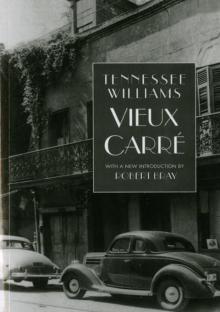 Vieux Carre
Vieux Carre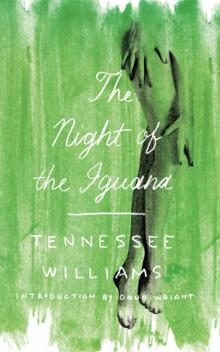 The Night of the Iguana
The Night of the Iguana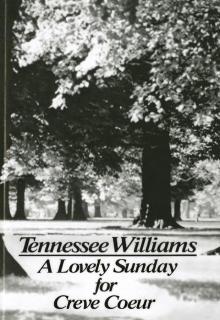 A Lovely Sunday for Creve Coeur
A Lovely Sunday for Creve Coeur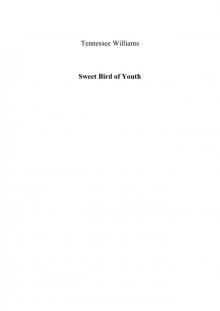 Sweet Bird of Youth
Sweet Bird of Youth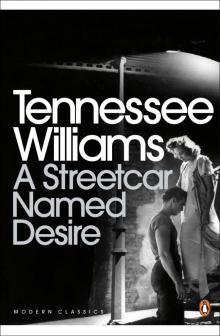 Streetcar Named Desire
Streetcar Named Desire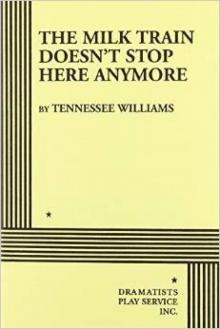 The Milk Train Doesn't Stop Here Anymore
The Milk Train Doesn't Stop Here Anymore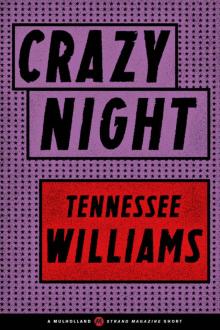 Crazy Night
Crazy Night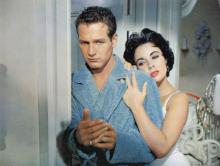 Three Plays of Tennessee Williams
Three Plays of Tennessee Williams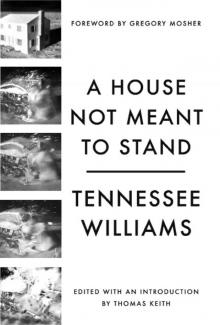 A House Not Meant to Stand
A House Not Meant to Stand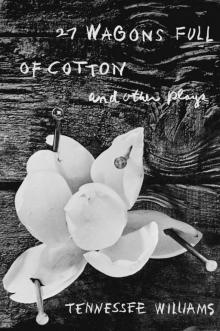 27 Wagons Full of Cotton and Other Plays
27 Wagons Full of Cotton and Other Plays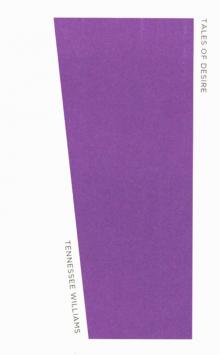 Tales of Desire
Tales of Desire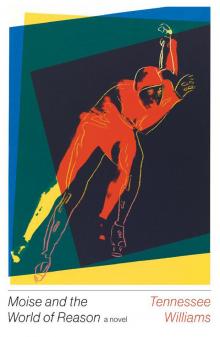 Moise and the World of Reason
Moise and the World of Reason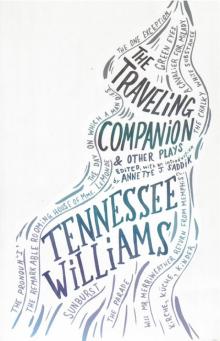 The Traveling Companion & Other Plays
The Traveling Companion & Other Plays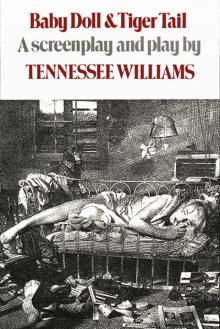 Baby Doll Tiger Tail: A Screenplay and Play by Tennessee Williams
Baby Doll Tiger Tail: A Screenplay and Play by Tennessee Williams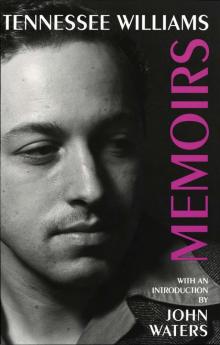 Memoirs
Memoirs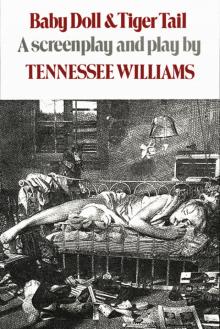 Baby Doll & Tiger Tail
Baby Doll & Tiger Tail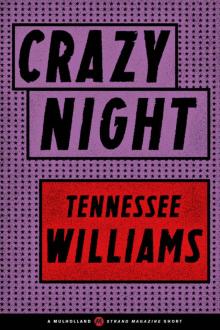 Crazy Night (A Mulholland / Strand Magazine Short)
Crazy Night (A Mulholland / Strand Magazine Short)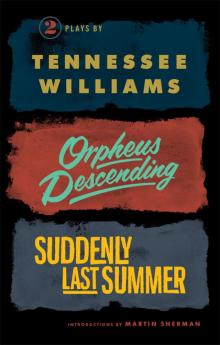 Orpheus Descending and Suddenly Last Summer
Orpheus Descending and Suddenly Last Summer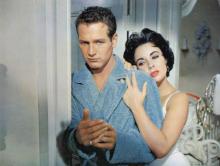 Three Plays
Three Plays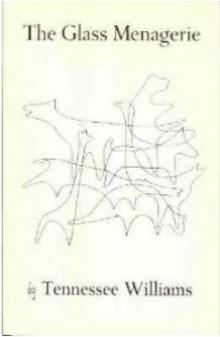 The Glass Menagerie
The Glass Menagerie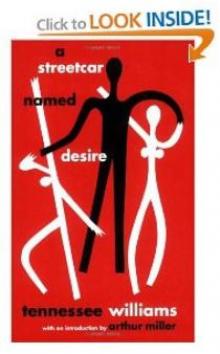 A Streetcar Named Desire
A Streetcar Named Desire